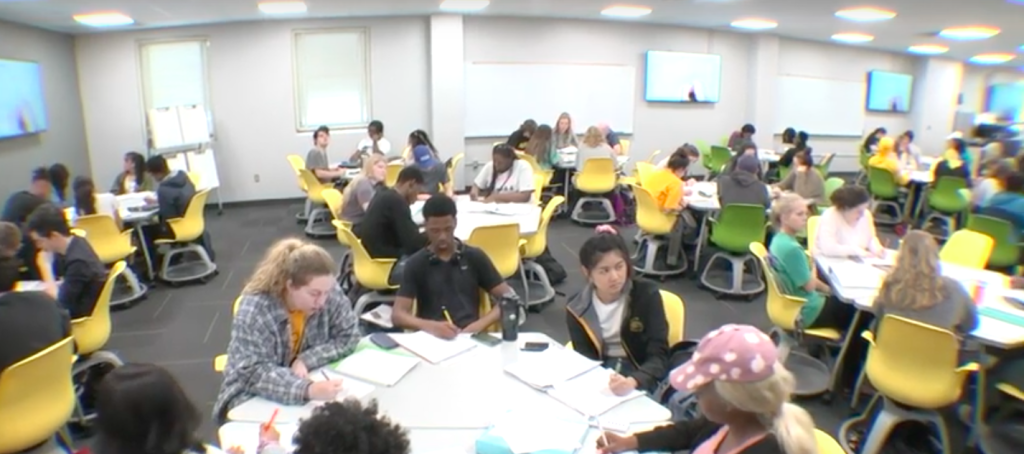ACUE sat down with Judith Eaton, president of the Council for Higher Education Accreditation (CHEA) to discuss the launch of their “National Quality Dialogue.” This effort includes reaching out to colleagues and faculty organizations to explore, reassess, and understand what quality in higher education looks like today and in the future. In this Q&A, Eaton shares her vision for the impact of this dialogue and elaborates on the role accreditation efforts plays in strengthening quality.
CHEA recently launched a major national conversation about quality in higher education. What insights are you hoping to learn and advance?
Our “National Quality Dialogue” is focusing on the future of academic quality in higher education. As part of this effort, we’ll be reaching out to academic colleagues and faculty organizations via Dialogue meetings, interviews and publications. We want to explore how the concept of quality may be changing, what tools we’ll all need for quality in the future, and how we build greater public confidence in our quality. While the longstanding commitments to education for intellectual development, career readiness, and civic engagement remain central to quality, we’re all aware of emerging challenges to current norms about social justice, equity, and free speech. It’s time to take a fresh look at quality in light of both the challenges and our longstanding commitments.
What do you see as the role of faculty, effective teaching, and pedagogical preparation in accrediting efforts to strengthen quality?
Accreditation cannot be successful in strengthening quality without faculty. Our educators are at the heart of accreditation’s commitments. A periodic accreditation review examines quality by looking at the many dimensions of college, university, or program operation—but this must be in light of their effectiveness in furthering student success. All accreditation inquiry must converge on student achievement. Faculty play—or should play—a huge role in assuring that the accreditation lens is and remains appropriately focused on students by informing and influencing accreditation activities such as the institutional self-study, the site visit and, most important, the formulation and application of accreditation standards. We need a strong faculty voice in accreditation to both frame the work of accreditation and to remind us, on an ongoing basis, that student success is our reason for being.
What are the standards by which regional accreditors measure teaching quality and faculty development? How can these standards be strengthened to ensure a greater focus is on student learning outcomes?
Accreditors have robust standards that address faculty qualifications, scholarship, and research. The standards typically reaffirm faculty members’ primary responsibility for advancing academic purposes and the importance of academic freedom. The standards also protect faculty by calling for well-defined responsibilities, evaluation, professional development, and adequate compensation. At the same time, a number of standards provide an opportunity to further the focus on student outcomes. These are the standards that call for ongoing, robust examination of quality and evidence of student achievement, commitment to opportunity for innovation, and the leadership role of faculty in development of curricula and academic standards. The most appropriate way to further strengthen the focus on student learning outcomes is for faculty, as already mentioned, to more fully engage with accreditation to expand this emphasis throughout the accreditation review process.
What can institutions do to ensure that their faculty members are more engaged in the accreditation process? What can faculty do?
The typical response of many faculty to becoming involved in accreditation is that it is an administrative, bureaucratic effort that has little to do with teaching, learning, and academic quality—and thus a waste of time. I understand this, but it need not be so. Accreditation needs faculty to sustain teaching and learning as central this effort. Faculty can play an active role in the accreditation self-study, on a self-study committee, and in writing the report. A number of accreditation standards for which evidence needs to be supplied address the faculty role: curriculum, academic standards, and academic support. Faculty should fully engage the site-visit team when it comes to campus and meet with team members. Institutions can help by making release time available, providing stipends, or finding other means to aid faculty in having the time to engage accreditation and to reward that engagement.
You’ve recently written about the “challenge of the unknowns” facing U.S. accrediting organizations as federal lawmakers consider different legislative changes that you say will “have a profound impact on accreditation.” What are some changes that could produce a stronger and more effective accreditation enterprise? What parts of accreditation should be preserved or protected?
The primary concern of lawmakers is accountability from accreditation, namely our responsibility to assure that institutions and programs receiving federal money are operating at an acceptable level of performance—meaning that students are graduating in sufficient numbers and obtaining jobs with good earnings. There is little talk among federal officials about the longstanding strengths of accreditation, all of which revolve around faculty. I would tell faculty that fighting for the strengths of accreditation is the same as fighting for their intellectual independence and academic leadership. Accreditation’s strengths are advocacy for a fundamental reliance on peer review, formative evaluation, and quality improvement. They include advocacy for academic freedom and the central commitment to mission. Faculty authority and leadership in the classroom, in research, and in the community cannot be preserved in the face of atrophying commitment to peer review, formative evaluation, mission, and academic freedom. Unless faculty work with us to maintain these strengths, accreditation in the future may look more like an accountability undertaking and less like the quality improvement effort it is intended to be.
One last question. We suspect a lot of ACUE-credentialed faculty members would love to be part of CHEA’s National Quality Dialogue. Can we host a session?
You bet!
What to read next: The Fractal Educator by Natasha Jankowski and Ken O’Donnell


